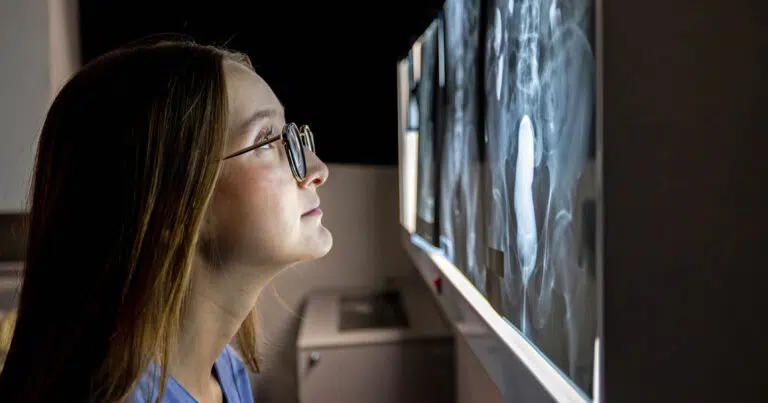Radiology Technologist Salary Guide
- Requirements
- Radiology Technologist Salary Insights
- Top Radiology Technologist Jobs
- Featured Blog Posts
- Salary Tips
- Radiology Technologist FAQs
An interventional radiology (IR) technologist is a radiologic technologist with specialized training in assisting with minimally invasive procedures. Physicians use small tools and imaging equipment to diagnose and treat diseases during IR procedures. The IR tech assists by performing imaging scans, administering contrast material, monitoring patients and informing other team members of any concerning patient status changes. IR technologists assist with various procedures, including angioplasty, clot embolization and stent placement.
How do you become an interventional radiology technologist?
At a minimum, you must complete an associate's degree in radiologic technology, which typically takes 2 years. Radiologic technology programs usually include courses in anatomy and physiology, radiographic physics, patient care and radiographic positioning. You should also expect to complete a clinical practicum, allowing students to apply what they've learned in class. During your practicum, you get hands-on experience working with patients and operating radiographic equipment.
According to the American Society of Radiologic Technologists, 47 states require all interventional radiologic technologists to be licensed as of 2022. The exact licensing requirements depend on where you live.
What credentials/licensing does an interventional radiology technologist require?
Many states require radiologic technologists to obtain national certification as part of the licensing process. For example, Arizona includes a credential from the American Registry of Radiologic Technologists (ARRT) or the Nuclear Medicine Technology Certification Board (NMTCB) as part of its process. In addition to the Radiography RT certification, ARRT offers several relevant credentials, including Vascular-Interventional Radiography RT and Cardiac-Interventional Radiography RT certifications.
NMTCB offers the Radiation Safety Certification, which helps radiologic technologists demonstrate their competency in safety matters related to using X-rays, computed tomography equipment, fluoroscopy and magnetic resonance imaging. Check with your state's licensing body to find out if you need a certification from either organization.
Average Radiology Technologist Salary
$35.57/hour
The average salary for a Radiology Technologist is $35.57 per hour. This is 8% lower than the practicing US average of $38.32.
Last updated on December 19, 2025. Based on active jobs on Vivian.com.
Salaries for Radiology Technologist compared to Allied Health Professional National Averages
$35.57/hour
8% lower than the practicing US average.
$38.32/hour
United States
What are the highest paying Employers and Agencies for Radiology Technologist jobs?
| Average Hourly Salary | Max Hourly Salary | |
|---|---|---|
| Tenet North Cal | $55 | $81 |
| Community Medical Centers | $50 | $53 |
| Tenet Desert | $47 | $49 |
| Adventist Health | $46 | $61 |
| Cook Children’s Health Care System | $44 | $44 |
| Medical Solutions Direct Hire | $39 | $56 |
| Core Medical-Perm | $37 | $45 |
| MedQuest | $35 | $35 |
| UCHealth (Colorado) | $35 | $52 |
| Memorial Hermann Health System | $35 | $35 |
Last updated on December 19, 2025. Information based on active jobs on Vivian.com and pay data from BLS and around the web.

Radiology Technologist Career Guide
Use our exclusive Career Guides to research the education, qualifications, skills and responsibilities for a variety of healthcare disciplines and specialties employers are hiring now.
Go to the guideTop Radiology Technologist Jobs
Director - Radiology Technologist
- Adventist Health
- San Luis Obispo, CA
$169K-253K/year
Director - Radiology Technologist
- Adventist Health
- Saint Helena, CA
$161K-241K/year
Director - Radiology Technologist
- UCHealth (Colorado)
- Colorado Springs, CO
$132K-211K/year
approximately $63-102/hrDirector - Radiology Technologist
- Emanuel Medical Center
- Turlock, CA
- 5x8 hrs
$62-100/hour
Manager - Radiology Technologist
- Adventist Health
- San Luis Obispo, CA
$126K-189K/year
Get alerts about new jobs and salary trends
Be the first to know about new jobs for Radiology Technologists with the salary that suits you.
How can you increase your pay as an interventional radiology technologist?
Another way to increase your income is to earn a bachelor's degree. According to the BLS Education Pays Report for 2022, the median salary for workers in any field with 4-year degrees is 38.5% higher than the median salary for workers with 2-year degrees.
Obtaining additional credentials is also an excellent way to bump up your earnings. For example, if you have a certification in general radiography, earning a credential in cardiovascular or vascular radiologic technology may help you qualify for higher-paying jobs.
How much does a staff interventional radiology technologist make?
According to Vivian Health's salary data for the week ending April 15, 2023, staff interventional radiology technologists earned an average of $30.34 per hour. Assuming you work 40 hours per week, that's a weekly salary of $1,213.60 and an annual salary of $63,107.20.
Is interventional radiology technologist a growing career?
Based on occupational outlook data for 2021, analysts from the U.S. Bureau of Labor Statistics (BLS) expect the demand for interventional radiology techs to increase by 6% between 2021 and 2031, adding more than 14,000 jobs to the economy. The BLS includes interventional radiology techs in its projections for radiologic technologists and MRI technologists. Analysts attribute the positive outlook for radiologic technologists to the growing population of older adults in the United States.
What types of employers/facilities have the most interventional radiology technologists employed?
Hospitals employ 58% of all radiologic technologists, making them the most common work environment for IR techs. Physician offices employ another 19%, while outpatient care centers and medical laboratories employ 7% each. Some IR techs work for the federal government, but these jobs account for only 3% of all employment in the field. All employment data comes from the BLS Occupational Outlook Handbook.
Which employers/facilities have the highest pay?
Despite employing the smallest percentage of IR techs, federal agencies offer the highest salaries. According to 2021 BLS data, outpatient care centers pay about 6% less than the federal government. Medical and diagnostic laboratories come next, with average salaries around 8% lower than you typically find at an outpatient care center. Hospitals and physician offices offer the lowest average salaries.
How does interventional radiology technologist pay compare to similar healthcare jobs?
For staff jobs, the average salary for an interventional radiology technologist is on the low side. For example, staff radiology technicians earned an average of $41 per hour, according to Vivian Health's salary data from April 15, 2023, about 35% more than IR techs. In contrast, travel IR techs earned more than travel radiology technicians during this same period. Travel radiology technicians averaged $2,408 weekly, about 11.6% lower than the average for travel IR techs.
Featured Blog Posts
Featured Blog Posts



Radiology Technologist FAQs
What professional certifications can potentially increase my salary as a Radiology Technologist?`
Earning your Sonography RT (S-ARRT) or Positron Emission Technology (PET-NMTCB) often increases your salary potential as a radiology technologist or makes you eligible for another position with greater responsibilities, which also might include a bump in wages.
Earning the Fluoroscopy Permit (CA) is required if you reside in California and need to operate fluoroscopy equipment as part of your job.
Can having a Sonography RT (S-ARRT) boost my salary as a Radiology Technologist?
Yes, having a Sonography RT (S-ARRT) or any relevant professional certification has the potential to boost your salary as a radiology technologist.
Can having a Positron Emission Technology (PET-NMTCB) boost my salary as a Radiology Technologist?
Yes, having a Positron Emission Technology (PET-NMTCB) or any relevant professional certification has the potential to boost your salary as a radiology technologist.
Where can I learn more about working as a Radiology Technologist?
Take a look at Vivian's Radiology Technologist Career Guide for more information, including required education, responsibilities, pros and cons and more.